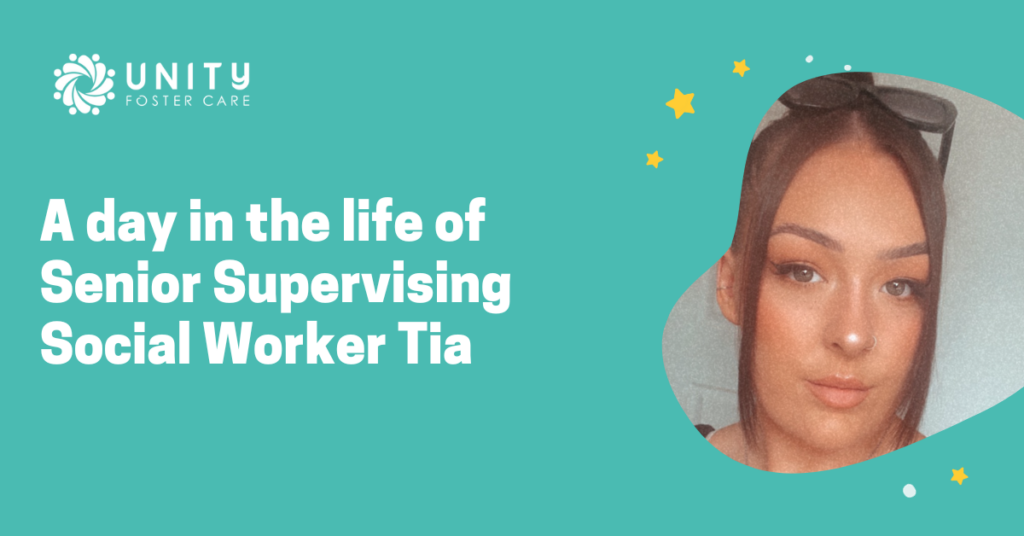
A day in the life of Senior Supervising Social Worker Tia
Here at Unity Foster Care, our team is dedicated to making sure children have a safe and stable home environment. A key member of our tight-knit team is Senior Supervising Social Worker Tia.
We sat down with Tia, to find out more about what her role involves and how she supports Unity Foster Care on their mission to make a difference and have a positive, lasting effect on children’s lives.
Can you please tell us a bit about yourself?
My name is Tia, and I’m a Senior Supervising Social Worker for Unity Foster Care. I’ve worked in social care for about four years, starting as a Child Protection Social Worker for Leeds Local Authority. I was successful in obtaining a job with Leeds following graduating from university with my social work degree. I have always wanted to be a social worker, which I think came from seeing a lot of poverty as I was growing up. My mum says I was always the child who would be offering to help other children. I’m 25 years old, and I’m very career-focused.
Can you tell me more about what your role involves?
I support foster carers and supervising social workers within the agency, by completing supervisions, being an advocate for their views, and providing guidance. I attend and contribute to meetings, and I complete administrative work, which includes, but is not limited to, reports and minutes. I spend time with, listen to, and gain the views of children within the agency to ensure they are happy and safe. I also support the management team with any additional tasks required. I’m one of the ‘go-to people’ if anyone in the agency needs any guidance or support, and I am always happy to help. I also attend our community events and foster carer forums.
What’s the importance of a Senior Supervising Social Worker?
The Senior Supervising Social Worker plays a key role in supporting foster carers on their journey, allocating training, and being the person that they can share their views with and hopefully feel able to confide in. Many children have experienced trauma and adverse childhood experiences; therefore, they may have differing needs and behaviours, which sometimes can be unpredictable. This is why it’s important to be available and flexible with foster carers and staff. Fostering is not just a job role, it is a lifestyle change, and it is important for the foster carers to feel heard. Supervisions are an important part of ensuring that foster carers feel supported, but additionally to assist with progression and growth within their role. We contribute to ensuring children receive good quality care and have a safe and stable home environment, which is at the heart of what we do. Senior Supervising Social Workers play a role in practically and emotionally supporting other social workers within the agency and enhancing their progression, also. We ensure that policies and procedures are followed consistently.
What does a typical day look like for you?
A typical day tends to involve attending supervisions and meetings, completing training, completing phone calls, administrative work, and liaising with many different professionals. No day is the same. Within this job role, emergencies and crisis can occur, which take priority. I’m mainly based around South Yorkshire and Leeds
What’s the most rewarding thing about your role?
The most rewarding thing is seeing children thrive, with the care and support our foster carers provide. We celebrate with children in their achievements and accomplishments. It’s lovely to see the positive relationships that children build with their foster carers, their birth family, and professionals. It is rewarding to see them settle after such a challenging, confusing, and traumatic time. It is equally as rewarding to make a difference and see our foster carers’ commitment and dedication to children every single day.
Any positive stories to share?
Each foster carer is fantastic, but one example particularly stands out. The foster carer in question currently provides respite care, and her biggest strength is the opportunities and experiences that she provides to children. She’s so commendable for her commitment, and she is very creative and thoughtful about each individual child. For example, she cared for a young boy who was non-verbal and diagnosed with autism. It was challenging to communicate and fully understand his needs and wants. However, the foster carer knew that he hadn’t ever been on a bus before, so she sought an access bus, to meet his individual needs and ensure he would not be overstimulated. The bus collected them from home, drove them to a café, and returned them home. He had an absolutely brilliant time. The foster carer is dedicated to providing children with positive memories and experiences that they can cherish.
Any advice for someone considering fostering?
My advice would be to be open-minded and to not go into this role with any unrealistic expectations. Children who are looked after have experienced adverse childhood experiences and trauma; therefore, they have individual needs, often relating to what they’ve experienced or been exposed to. It’s important to look beyond the behaviours they may present and to understand how their experiences contribute to their responses. Fostering is not an easy role; there are challenges, but the difference you can make for these children is worth it, and importantly, they deserve that and more.
Could you make a difference to the lives of children and young people in your area?
Our friendly team are on hand to answer any questions you may have. To make a start on your application, call us on 0333 772 2333 or contact us online and we’ll be in touch.
